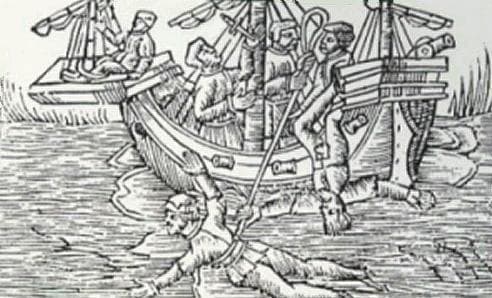-
Ašvieniai, the divine twins who pulled the chariot of the Sun (the Vedic Ashwins).
(Gods and goddesses) (Names from folklore myths and legends) -
Aušrinė, the Morning Star, a goddess, a daughter of the God ("dievaitė"). She was the goddess of the morning. Alternatively her name is given as Aušra ("dawn"). (Usha in Vedic religion.)
(Gods and goddesses) (Names from folklore myths and legends) -
Auštaras (Auštra), the god of the northeast wind, who stands at the gates of paradise and lights the way for those going to paradise. His function of shining this beacon makes him similar to Aušrinė; some consider him to be her cousin.
(Gods and goddesses) (Names from folklore myths and legends) -
Bangpūtys, the god of the seas and storms ––he is two-faced like the Roman god Janus.
(Gods and goddesses) (Names from folklore myths and legends) -
Dalia, goddess of fate and weaving.
(Gods and goddesses) (Names from folklore myths and legends) -
Deivės Valdytojos (Lithuanian: Governing Goddesses), were the goddesses who made garments from human's lives. They were seven sisters: Verpiančioji (who spun the threads of life), Metančioji (who threw rims of life), Audėja (the weaver), Gadintoja (who broke the thread), Sergėtoja (who scolded Gadintoja, and instigated war between people), Nukirpėja (who cut the cloth of life), and Išskalbėja (the laundress). They have similarities with the Greek Fates and the Norse Norns. Deivės Valdytojos were associated with Dalia and Laima.
(Gods and goddesses) (Names from folklore myths and legends) -
Dievas, ("God"), the supreme deity
(Gods and goddesses) (Names from folklore myths and legends) -
Dievas Senelis ("God Old Man"), a teacher of people and judge of their morality. He looks like an old traveling beggar. Dievas Senelis is proficient at magic and medicine. Epithet of Dievas.
(Gods and goddesses) (Names from folklore myths and legends) -
Gabija, the foster of the Holy Fire, a goddess, a daughter of Dievas ("dievaitė").
(Gods and goddesses) (Names from folklore myths and legends) -
Laima, goddess of Fate and pregnant women.
(Gods and goddesses) (Names from folklore myths and legends) -
Mėnuo, the Moon, a son of Dievas ("dievaitis").
(Gods and goddesses) (Names from folklore myths and legends) -
Perkūnas, the Thunder, the main god. ("dievaitis") (Parjanya/Indra in Vedic religion).
(Gods and goddesses) (Names from folklore myths and legends) -
Praamžius, Pramšans, Pramžimas, Praamžimas, an epithet of Dievas (the chief god); probably of later literary origin.
(Gods and goddesses) (Names from folklore myths and legends) -
Saulė, the Sun Goddess (Surya in Vedic religion)
(Gods and goddesses) (Names from folklore myths and legends) -
Vakarinė, goddess of the Evening Star.
(Gods and goddesses) (Names from folklore myths and legends) -
Vėjopatis, god of the wind and master of Dausos (paradise)
(Gods and goddesses) (Names from folklore myths and legends) -
Žemyna, goddess, the deified soil (Zamin in Persian and Hindi for "land").
(Gods and goddesses) (Names from folklore myths and legends) -
Žvaigždės (singular: žvaigždė), stars. Saulė (the sun) is their mother and sometimes with the Moon as their father. One of the most important stars is Aušrinė. Other stars, Aušrinė's sisters, are less important, but they sometimes appear in mythic stories too. Especially notable ones are Vakarinė or Vakarė (the evening Venus, who makes the bed for Saulė), Indraja (Jupiter), Sėlija (Saturn), Žiezdrė (Mars), and Vaivora (Mercury).
(Gods and goddesses) (Names from folklore myths and legends) -
Pajauta, the legendary princess of Kernavė
(Heroes and heroines) (Names from folklore myths and legends) -
Jūratė and Kastytis are heroes of a Lithuanian legend, which subsequently became popular, mostly because of its modern poetic interpretation by Maironis. The queen of the amber palace Jūratė may be considered a manifestation of the goddess of Sea in this legend.
(Heroes and heroines) (Names from folklore myths and legends) -
Ežerinis, a spirit of lakes
(Local and nature spirits) (Names from folklore myths and legends) -
Javinė, a household goddess who protects grain in barns.
(Local and nature spirits) (Names from folklore myths and legends) -
Jievaras, a household spirit who protects grain. Sacrifices to Jievaras are made after the rye harvest. While cutting grain, women would leave a few grain tufts uncut, which would later be braided into plaits. They would also leave some bread and salt under the plait, and would say: Davei manei, Žemele, duodame ir tau ([You] gave for us, Mother Earth, we are giving for you too), a request for the land to continue to be fruitful.
(Local and nature spirits) (Names from folklore myths and legends) -
Kupolė, the spirit of springtime vegetation and flowers. The Festival of Kupolė (Kupolinės) was associated with Feast of St. John the Baptist (Joninės). In this festival, women picked sacral herbs, danced and sang songs. Kupolinės is also known as Rasos. Compare this with Ziedu māte in Latvian mythology, Kupala in Polish mythology and Ivan Kupala in Russian mythology
(Local and nature spirits) (Names from folklore myths and legends) -
Laukų dvasios (spirits of fields), spirits, who were running through the fields. When crops in the fields waved in the wind, people saw them as being the actions of spirits. Laukų dvasios include Nuogalis, Kiškis (hare), Meška (bear), Lapė (fox), Katinas (tomcat), Bubis, Bubas, Bubė, Baubas, Babaužis, Bobas, Maumas (bugaboo), Raudongalvis (red-headed), Raudongerklis (red-throated), Žaliaakis (green-eyed), Paplėštakis, Guda, Dizikas, Smauglys (boa), Ruginis (spirit of rye), Papiokė, Pypalas, Žebris, Arklys (horse), Vilkas (wolf).
(Local and nature spirits) (Names from folklore myths and legends) -
Upinis, a spirit of rivers
(Local and nature spirits) (Names from folklore myths and legends) -
Kaukas, spirits similar to leprechauns.
(Various lower beings) (Names from folklore myths and legends) -
Laumė, a fairy-like female creature (pixies). Described as white and blue as the sky itself. Good spirit, very friendly with the Earth and Nature gods. However, if anyone tried to use them, the punishment was severe.
(Various lower beings) (Names from folklore myths and legends) -
Nykštukas, gnomes.
(Various lower beings) (Names from folklore myths and legends) -
Vėlės, spirits of dead human beings.
(Various lower beings) (Names from folklore myths and legends) -
Aitvaras, a household spirit bringing both good and bad luck
("Demonic" beings) (Names from folklore myths and legends) -
Baubas, an evil spirit with long lean arms, wrinkly fingers and red eyes. He harasses people and tears their hair or stifles them. To children, he is the equivalent of the boogeyman of the English-speaking countries. A misbehaving child could be told by the parents: "Behave, or baubas will come and get you". Also it could be described as a black and dark creature living under the carpet or in some dark spot of the house.
("Demonic" beings) (Names from folklore myths and legends) -
Giltinė – goddess of death, also The Reaper. Other names include Kaulinyčia, Maras (black death or the Plague), Maro mergos, Kolera, Pavietrė, Kapinių žmogus. Her sacred bird is the owl. Sometimes she was considered to be a sister of Laima (luck).
("Demonic" beings) (Names from folklore myths and legends) -
Ragana is an old-looking female or witch. Mostly has dark intentions and powers to control forces of nature. They probably were old ladies living by the forest, having a good knowledge of plants and their use for medical and other purposes. Though she was called "the bad guy", she was actually taking care of balance in the world.
("Demonic" beings) (Names from folklore myths and legends) -
Slogutis means pain, misery or nightmare. Also can mean fear or bad feelings.
("Demonic" beings) (Names from folklore myths and legends) -
Pinčiukas, devil, not the pure evil being of Christianity, but a trickster. Earlier - dweller or even god of bogs and marshes.
("Demonic" beings) (Names from folklore myths and legends) -
Žiburinis, a scary forest spirit that appears as a phosphorescent skeleton.
("Demonic" beings) (Names from folklore myths and legends) -
Dausos or Dangus, the home of good souls. Dausos is on a high mountain (Latvian Debeskalns, or Norse Valhalla), between two rivers. There are golden apple-trees in the Dausos garden. Day in the garden is perpetual but outside its confines is perpetual night. Master of Dausos is Vėjopatis (Lord of the wind) or Vėjas (Wind) who is also one of the oldest gods in Lithuanian mythology. Vėjas is identical to Vayu of Hinduism. Auštaras and Vėjopatis are keepers of Dausos’s gates (Dausų Vartai). While Auštaras shows the way for good souls, Vėjas (Vėjopatis) blows bad souls into oblivion.
(Holy places and things) (Names from folklore myths and legends) -
Sovijus in 13th-century Russian chronicles was a person who introduced the pagan custom of burning bodies after death, according to studies by Gintaras Beresnevičius. The mediaeval chronicles tell that this custom is very old and was called Sovica. Sovica was practicated not only by Lithuanians but also by other pagan tribes (Livonians, Estonians and others).
(Earliest Russian chronicles) (Names by written sources) -
Žvoruna (Zvoruna) was a euphemism for the hunting and forest goddess like Roman Diana. Her name is connected with wild animals. There was mentioned in chronicle that she is a bitch, it means that her zoomorphic shape is female dog.
(Earliest Russian chronicles) (Names by written sources) -
Medeina (Medeinė) is another euphemism of the hunting and forest goddess. Medeina also was mentioned in the 16th century by J. Lasicki. She was worshiped by King Mindaugas and represented military interest of warriors.
(Earliest Russian chronicles) (Names by written sources) -
Teliavelis (Televelis) was a powerful smith who made the sun and threw it to the sky. This myth survived in folk tales in the beginning of the 20th century. Some scholars, like K. Būga tried to prove that Televelis is incorrectly written Kalvelis (smith diminutive in Lithuanian). Teliavelis has connections with Finnish Ilmarinen.
(Earliest Russian chronicles) (Names by written sources) -
Andajus (Andajas, Andojas, etc.) was mentioned in medieval chronicles as the supreme deity. It may be euphemism for Dievas. It is mentioned in chronicle that warriors invoke Andajus in battle.
(Earliest Russian chronicles) (Names by written sources) -
Nonadievis (Nunadievis; etimologized by some scholars as Numadievis) is an incorrectly-written name of the supreme god or just another euphemism.
(Earliest Russian chronicles) (Names by written sources) -
Perkūnas was the god of thunder, one of the most powerful deities. Perkūnas survived in popular belief and folk tales till the 20th century.
(Earliest Russian chronicles) (Names by written sources) -
Diviriks is thought to be one of Perkūnas' euphemisms, meaning "leader of gods".
(Earliest Russian chronicles) (Names by written sources) -
Perkūnas (Percuno) – god of thunder
(Martynas Mažvydas) (Names by written sources) -
Laukosargas (Laucosargus) – god of grains and other agricultural plants
(Martynas Mažvydas) (Names by written sources) -
Žemėpatis (Semepates) – god of cattle and other farm animals
(Martynas Mažvydas) (Names by written sources) -
Aitvaras and kaukas (Eithuaros and Caucos) – evil spirits
(Martynas Mažvydas) (Names by written sources) -
Prakorimas (Prokorimos) – the supreme deity. Stryjkowski elaborated that people used to sacrifice white cocks to Prakorimas. Their flesh was divided into three pieces: one for peasants, another for pagan priests (Lithuanian: žynys), and a third for burning. Stryjkowski pointed out that Prakorimas was similar to the Prussian supreme god Okopirmas.
(Maciej Stryjkowski) (Names by written sources) -
Rūgutis (Ruguczis) – god of fermentation and fermented foods
(Maciej Stryjkowski) (Names by written sources) -
Žemininkas (Ziemennik) – god of land and agriculture. The cult of the žaltys (grass snake) is associated with the cult of Žemininkas.
(Maciej Stryjkowski) (Names by written sources) -
Krūminė (Kruminie Pradziu Warpu) – deity of ears, provider of crops
(Maciej Stryjkowski) (Names by written sources) -
Lietuvonis (Lituwanis) – god of rain
(Maciej Stryjkowski) (Names by written sources) -
Kauriraris (Chaurirari) – deity of war and warhorses. The name etymology is unclear. Vladimir Toporov suggested that it is derived from the Lithuanian word kaurai (fur), while Wilhelm Mannhardt argued it stems from karas (war).
(Maciej Stryjkowski) (Names by written sources) -
Sutvaras (Sotwaros) – god of all cattle
(Maciej Stryjkowski) (Names by written sources) -
Šeimos dievas (Seimi Dewos) – god of family
(Maciej Stryjkowski) (Names by written sources) -
Upinis dievas (Upinis Dewos) – god of rivers
(Maciej Stryjkowski) (Names by written sources) -
Bubilas – god of honey and bees
(Maciej Stryjkowski) (Names by written sources) -
Didis Lado (Dzidzis Lado) – the great god. Festivities, songs, and dances in his honor lasted from May 25 to June 25. There are doubts whether this represents an actual god.
(Maciej Stryjkowski) (Names by written sources) -
Gulbis (Gulbi Dzievos) – the good spirit of every human, guardian angel
(Maciej Stryjkowski) (Names by written sources) -
Ganiklis (Goniglis Dziewos) – god of herds and shepherds
(Maciej Stryjkowski) (Names by written sources) -
Šventpaukštinis (Swieczpunscynis) – god of all domesticated and wild birds. People did not offer sacrifices to him as he was a free spirit.
(Maciej Stryjkowski) (Names by written sources) -
Kelių dievas (Kielu Dziewos) – god of roads, trade and travel
(Maciej Stryjkowski) (Names by written sources) -
Pušaitis or Puškaitis (Puszajtis) – deity of land, dwelling in elder bushes and commanding chthonic dwarfs (barstukas)
(Maciej Stryjkowski) (Names by written sources) -
Aukštėjas (Auxtheias Vissagistis) – a euphemism for the supreme god. Derived from the Lithuanian word aukštas (high).
(Jan Łasicki) (Names by written sources) -
Žemėpatis (Zemopacios)
(Jan Łasicki) (Names by written sources) -
Perkūnas (Percunos) – god of thunder
(Jan Łasicki) (Names by written sources) -
Audros – god of storms
(Jan Łasicki) (Names by written sources) -
Algis
(Jan Łasicki) (Names by written sources) -
Aušra (Ausca) – the morning star (Venus). Her other name was Aušrinė.
(Jan Łasicki) (Names by written sources) -
Bežlėja (Bezlea)
(Jan Łasicki) (Names by written sources) -
Brėkšta (Breksta) – goddess of twilight. Also could be a euphemism for Vakarė.
(Jan Łasicki) (Names by written sources) -
Ligyčius (Ligiczus)
(Jan Łasicki) (Names by written sources) -
Datanus
(Jan Łasicki) (Names by written sources) -
Kirnis (Kirnus) – local god of cherries
(Jan Łasicki) (Names by written sources) -
Kremata – god of hogs
(Jan Łasicki) (Names by written sources) -
Pyzius (Pizio) – god of spouses
(Jan Łasicki) (Names by written sources) -
Medeina (Modeina et Ragaina) – goddess of forest and hunting
(Jan Łasicki) (Names by written sources) -
Kerpyčius and Šilinytis (Kierpiczus and Siliniczus) – gods of forest, mosses and lichens
(Jan Łasicki) (Names by written sources) -
Tavalas (Tavvals) – deity of physical strength. Gintaras Beresnevičius noted that this deity could be the same as medieval Teliavelis.
(Jan Łasicki) (Names by written sources) -
Orthus
(Jan Łasicki) (Names by written sources) -
Ežerinis (Ezernim) – spirit or deity of lakes. Derived from ežeras (lake).
(Jan Łasicki) (Names by written sources) -
Sidžius, Simonaitis and Ventis Rekičionis (Simonaitem, Sidzium, Ventis Rekicziouum) – spirits worshiped by individual noble families
(Jan Łasicki) (Names by written sources) -
Karvaitis Ėraitinis (Kurvvaiczin Eraiczin) – deity of calves and lambs
(Jan Łasicki) (Names by written sources) -
Gardūnytis (Gardunithis) – protector of newly-born lambs
(Jan Łasicki) (Names by written sources) -
Prigirstytis (Prigirstitis) – can hear whispers
(Jan Łasicki) (Names by written sources) -
Derintojas (Derfintos)
(Jan Łasicki) (Names by written sources) -
Bentis
(Jan Łasicki) (Names by written sources) -
Laukpatis (Lavukpatimo)
(Jan Łasicki) (Names by written sources) -
Priparšis (Priparscis)
(Jan Łasicki) (Names by written sources) -
Ratainyčia (Ratainicza) – god of horses
(Jan Łasicki) (Names by written sources) -
Valgina (Walgina) – god of cattle
(Jan Łasicki) (Names by written sources) -
Krikštas (Kriksthos) – protector of tombstones
(Jan Łasicki) (Names by written sources) -
Apydėmė (Apidome) – deity of changed residence. The name is also known from hand-written collection of sermons from 1573.
(Jan Łasicki) (Names by written sources) -
Kriukis (Krukis) – deity of pigs
(Jan Łasicki) (Names by written sources) -
Lazdona (Lasdona) – goddess of hazelnuts
(Jan Łasicki) (Names by written sources) -
Bubilas (Babilos) – household god of bees, husband of Austėja
(Jan Łasicki) (Names by written sources) -
Žemyna (Zemina) – goddess of land and agriculture
(Jan Łasicki) (Names by written sources) -
Austėja (Austheia) – household goddess of bees, often presented as wife of Bubilas
(Jan Łasicki) (Names by written sources) -
Deuoitis
(Jan Łasicki) (Names by written sources) -
Vetustis
(Jan Łasicki) (Names by written sources) -
Guboi and Tvverticos
(Jan Łasicki) (Names by written sources) -
Veliuona (Vielona) – goddess of death
(Jan Łasicki) (Names by written sources) -
Warpulis
(Jan Łasicki) (Names by written sources) -
Salaus – no function recorded by Łasicki.
(Jan Łasicki) (Names by written sources) -
Šluotražis (Szlotrazis) – no function recorded by Łasicki. The name is derived from šluota (broom).
(Jan Łasicki) (Names by written sources) -
Tiklis – no function recorded by Łasicki.
(Jan Łasicki) (Names by written sources) -
Beržulis (Birzulis) – no function recorded by Łasicki. Based on etymology, it could be a god of birches and birch sap.
(Jan Łasicki) (Names by written sources) -
Šeryčius (Siriczus) – no function recorded by Łasicki. The name is possibly derived from šerti (feed).
(Jan Łasicki) (Names by written sources) -
Dvargantis (Dvvargonth) – no function recorded by Łasicki.
(Jan Łasicki) (Names by written sources) -
Klamals – no function recorded by Łasicki.
(Jan Łasicki) (Names by written sources) -
Atlaibas (Atlaibos) – no function recorded by Łasicki.
(Jan Łasicki) (Names by written sources) -
Numeias
(Jan Łasicki) (Names by written sources) -
Ublanyčia (Vblanicza) – patron of beggars
(Jan Łasicki) (Names by written sources) -
Dugnai – spirit of flour
(Jan Łasicki) (Names by written sources) -
Pesseias
(Jan Łasicki) (Names by written sources) -
Trotytojas kibirkščių (Tratitas Kirbixtu) – deity of spark, fire
(Jan Łasicki) (Names by written sources) -
Alabathis
(Jan Łasicki) (Names by written sources) -
Polengabia
(Jan Łasicki) (Names by written sources) -
Užpelenė (Aspelenie)
(Jan Łasicki) (Names by written sources) -
Budintojas (Budintaia)
(Jan Łasicki) (Names by written sources) -
Matergabiae
(Jan Łasicki) (Names by written sources) -
Raugo Žemėpatis (Rauguzemapati) – deity of sourdough, leaven and fermentation
(Jan Łasicki) (Names by written sources) -
Luibegeldas
(Jan Łasicki) (Names by written sources) -
Ziemennik
(Jan Łasicki) (Names by written sources) -
Vaižgantas (Waizganthos) – a god of flax
(Jan Łasicki) (Names by written sources) -
Gabija (Gabie) – goddess of household fire
(Jan Łasicki) (Names by written sources) -
Smik smik per velėną (Smik Smik Perleuenu) – a phrase rather than a being
(Jan Łasicki) (Names by written sources) -
Ežiagalis (Ezagulis) – god of death
(Jan Łasicki) (Names by written sources) -
Aitvaras (Aitvvaros)
(Jan Łasicki) (Names by written sources) -
Kaukas (Kaukie)
(Jan Łasicki) (Names by written sources) -
Gyvatė (Giuoitos) – black snake (see also žaltys)
(Jan Łasicki) (Names by written sources) -
Srutis and Miechutele – deities of paint and color
(Jan Łasicki) (Names by written sources) -
Žalius (Zallus) – god of disagreement
(Matthäus Prätorius) (Names by written sources) -
Žėlius (Zelus) – god of grass
(Matthäus Prätorius) (Names by written sources) -
Šulininis (Szullinnijs) – god of wells
(Matthäus Prätorius) (Names by written sources) -
Bangpūtys, Vėjopatis, Bičbirbis, Giltinė, Gota, Jaučių Baubis, Karvaitis, Ėraitis, Skalsa, Biržulis / Beržulis, Prigirstytis / Girystis, Ligyčius / Lygėjus, Kelio dievas / Kelukis
(Matthäus Prätorius) (Names by written sources) -
Drebkulis and Magyla - Prussian Lithuanian
(Matthäus Prätorius) (Names by written sources) -
Gabjauja (Gabvartas)
(Matthäus Prätorius) (Names by written sources) -
Praamžius (Pramżimas) – highest god, determines the fate of people, world, and other gods
(Theodor Narbutt) (Names by written sources) -
Ukapirmas (Okkapirmas) – preceded time, his feast is celebrated on December 25
(Theodor Narbutt) (Names by written sources) -
Viršaitis (Wirszajtos) – protected household, domestic animals. Narbutt claimed that he was equivalent to Auxtejas Wissagistis mentioned by Łasicki and to Roman Saturn
(Theodor Narbutt) (Names by written sources) -
Perkūnas (Perkunas) – thunder god
(Theodor Narbutt) (Names by written sources) -
Kovas (Kawas) – god of war
(Theodor Narbutt) (Names by written sources) -
Ragutis – god of beer, vodka, mead
(Theodor Narbutt) (Names by written sources) -
Santvaras or Sotvaras (Sotwaros) – god of daylight, poets, doctors
(Theodor Narbutt) (Names by written sources) -
Atrimpas (Atrimpos) – god of sea and water
(Theodor Narbutt) (Names by written sources) -
Gardaitis (Gardeoldiis) – god of wind, storm, protector of ships
(Theodor Narbutt) (Names by written sources) -
Poklius (Poklus) – god of death and underworld
(Theodor Narbutt) (Names by written sources) -
Kriukis (Krugis) – god of smiths
(Theodor Narbutt) (Names by written sources) -
Žiemininkas (Ziemienikas) – god of earth, harvest, and darkness
(Theodor Narbutt) (Names by written sources) -
Patelas (Patelo) – flying god of air, similar to an angel
(Theodor Narbutt) (Names by written sources) -
Šneibratas (Sznejbrato) – god of birds and hunting
(Theodor Narbutt) (Names by written sources) -
Kibirai (Kabiry) – a trinity
(Theodor Narbutt) (Names by written sources) -
Praurimė (Praurime) – goddess of sacred fire, she was served by vaidilutės
(Theodor Narbutt) (Names by written sources) -
Lada (Lado) – the great goddess, Rasos festival is dedicated to her
(Theodor Narbutt) (Names by written sources) -
Budtė (Budte) – goddess of wisdom
(Theodor Narbutt) (Names by written sources) -
Laima (Lajma) – goddess of fate
(Theodor Narbutt) (Names by written sources) -
Pelenų Gabija (Polengabia) – goddess of fireplaces
(Theodor Narbutt) (Names by written sources) -
Moterų Gabija (Matergabia) – goddess of bread and bakery
(Theodor Narbutt) (Names by written sources) -
Perkūnaitėlė (Perkunatele) – wife of Perkūnas
(Theodor Narbutt) (Names by written sources) -
Pilvytė (Pilwite) – goddess of money, riches, and good luck
(Theodor Narbutt) (Names by written sources) -
Lietuva (Liethua) – goddess of freedom, pleasure, joy
(Theodor Narbutt) (Names by written sources) -
Veliuona (Wellona) – goddess of eternity, afterlife
(Theodor Narbutt) (Names by written sources) -
Pergrubė (Pergrubie) – goddess of spring, flowers, gardens
(Theodor Narbutt) (Names by written sources) -
Milda – goddess of love, courtship
(Theodor Narbutt) (Names by written sources) -
Krūminė (Krumine) – goddess of grain, agriculture
(Theodor Narbutt) (Names by written sources) -
Nijolė (Nijola) – mistress of the underworld, wife of Poklius
(Theodor Narbutt) (Names by written sources) -
Alabatis – goddess of flax
(Theodor Narbutt) (Names by written sources) -
Aušra (Ausssra) – morning goddess
(Theodor Narbutt) (Names by written sources) -
Bezelea – evening goddess
(Theodor Narbutt) (Names by written sources) -
Brėkšta (Brekszta) – goddess of darkness and dreams
(Theodor Narbutt) (Names by written sources) -
Kruonis (Kronis) – goddess of time
(Theodor Narbutt) (Names by written sources) -
Užsparinė (Usparinia) – goddess of land borders
(Theodor Narbutt) (Names by written sources) -
Verpėja (Werpeja) – weaver of the thread of life
(Theodor Narbutt) (Names by written sources) -
Gondu – goddess of weddings
(Theodor Narbutt) (Names by written sources) -
Upinė (Upine) – goddess of rivers, springs
(Theodor Narbutt) (Names by written sources) -
Ratainyčia (Ratajniczu) – goddess protecting horses
(Theodor Narbutt) (Names by written sources) -
Valginė (Walgina) – goddess protecting domestic animals
(Theodor Narbutt) (Names by written sources) -
Luobo gelda (Lajbegelda) – goddess of knowledge and rumors
(Theodor Narbutt) (Names by written sources) -
Mėšlų boba (Mahslu baba) – goddess of garbage
(Theodor Narbutt) (Names by written sources) -
Budintoja – spirit that wakes sleeping people
(Theodor Narbutt) (Names by written sources) -
Austėja (Austheja) – goddess of bees
(Theodor Narbutt) (Names by written sources) -
Ragutiene Pati (Ragutenapati) – wife of Ragutis
(Theodor Narbutt) (Names by written sources) -
Žemės Motina (Zemmes mahti) – goddess of underground, responsible for lost items
(Theodor Narbutt) (Names by written sources) -
Gaila (Gajla) – spirit torturing people and animals
(Theodor Narbutt) (Names by written sources) -
Neris – nymph of Neris River
(Theodor Narbutt) (Names by written sources) -
Dugnė (Dugna) – nymph of rivers
(Theodor Narbutt) (Names by written sources) -
Ragana – goddess of trees
(Theodor Narbutt) (Names by written sources) -
Lazdona – goddess of hazelnut
(Theodor Narbutt) (Names by written sources) -
Medziojna – goddess of forests
(Theodor Narbutt) (Names by written sources) -
Pajauta – worshiped woman, daughter of Duke Kernius, wife of Živinbudas
(Theodor Narbutt) (Names by written sources) -
Birutė (Biruta) – worshiped woman, wife of Kęstutis
(Theodor Narbutt) (Names by written sources) -
Dimstipatis (mentioned by Jokūbas Lavinskis), is a masculine deity (genius loci). It is a household god, the guardian of houses and caretaker of the hearth. People sacrificed roosters and black hens to the deity. The birds were boiled; later people would gather around the kettle and eat the birds. The bones were burned. Sometimes Dimstipatis is reconstructed as a god of housewives, to whom pigs were sacrificed. Dimstipatis was also seen as a power protecting from fires.
(Other written sources) (Names by written sources) -
Dirvolika, Nosolus (Jesuit reports from 1605)
(Other written sources) (Names by written sources) -
Pagirnis (Jesuit reports from 1605)
(Other written sources) (Names by written sources) -
Baukuris (Kraziu kolegijos)
(Other written sources) (Names by written sources) -
Velinas (mentioned by Konstantinas Sirvydas)
(Other written sources) (Names by written sources) -
Javinė (Jawinne by Jacob Brodowski)
(Other written sources) (Names by written sources) -
Laima (Daniel Klein in 1666)
(Other written sources) (Names by written sources) -
Blizgulis, a god of snow. His name means "He who sparkles."
(Other names) (Names by written sources) -
Junda, Goddess of War
(Other names) (Names by written sources) -
Baubis, a household god of meat and cattle.
(Other names) (Names by written sources) -
Divytis, a god-like hero of fishermen legends. Fishermen at sea sang songs about Divytis.
(Other names) (Names by written sources) -
Gardaitis, a god (a spirit?) of ships and sailors.
(Other names) (Names by written sources) -
Jagaubis, a household spirit of fire and the furnace.
(Other names) (Names by written sources) -
Rasa, Kupolė's and Kaupolis' daughter. She is the goddess of summer's greenage and flowers.
(Other names) (Names by written sources) -
Mokas, a stone with an ability to teach people, sometimes they are found in families - with wife Mokienė and children Mokiukas
(Other names) (Names by written sources)
New Random Display Display All Items(210)









